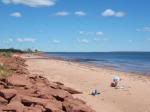Island of Wings by Karin Altenberg, 308 pages
Orange Prize Longlist 2012; What's in a Name 5: topological feature
Some books, when you read the description, sound perfect for you. The plot, the characters, the setting - I'll love this book, you think. And usually you do. There are other books, where the description sounds boring. Island of Wings - missionary minister and his new wife head to a isolated island, full of birds, in the 1830s, to bring civilization to the natives. None of that sounds good to me, and yet Karin Altenberg kept me interested and reading the whole time. Colour me surprised and impressed!
Good historical fiction makes you want to learn more about the people or the time or place of the novel. St Kilda's, the isolated island off the coast of the Hebrides Island off Scotland, is a World Heritage Site, both for cultural and ecological reasons. St Kilda's Site is just the site to investigate, after reading the book, to get an update on the inhabitants and the research that is going on there now. I was fascinated by the history of the island and these images from Google maps are beautiful. Altenberg based her story on real characters and the history of the island. Facts like the 8-day infant illness (infants on the island had a 60% fatality rate in those days) showed the research and tragedy of the island.
Rev Mackenzie, full of optimistic, paternalistic, British hubris arrives on St Kilda's Island with his new young wife, reading to enlighten the natives, whether they want it or not. (oops, my opinion of missionary work is coming though). Altenberg keeps her characters very real, with strengths and faults. Mackenzie did have a good heart, but his conceit and ego caused problems, with the St Kildans, and with his wife. Lizzie, his wife, seemed to try to fit in, although she never made any attempt to learn the Gaelic language.
[Mackenzie] felt pleased to have reached the moment when the St Kildans, who had thought themselves complete and self-sufficient, had been made to realize that they were not and, moreover, that he was the one who had led their minds to this conclusion. p 134
A study of a marriage disintegrating, a look at the role of religion and colonialism, and some great history combined to make this a fascinating read, worthy of the Orange Prize nomination.
Sunday, April 29, 2012
BOOK: Island of Wings by Karin Altenberg
2012-04-29T11:15:00-04:00
raidergirl3
Subscribe to:
Post Comments (Atom)





